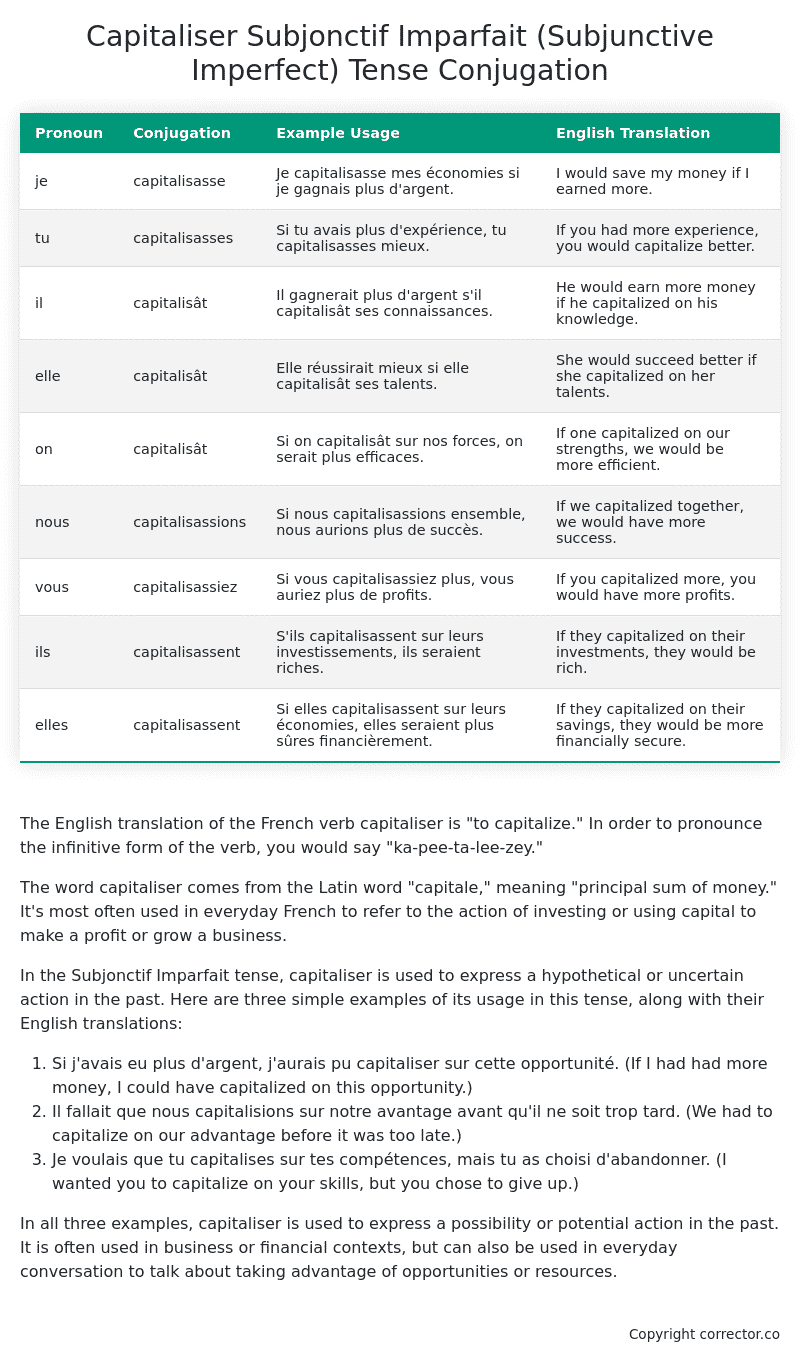Subjonctif Imparfait (Subjunctive Imperfect) Tense Conjugation of the French Verb capitaliser
Introduction to the verb capitaliser
The English translation of the French verb capitaliser is “to capitalize.” In order to pronounce the infinitive form of the verb, you would say “ka-pee-ta-lee-zey.”
The word capitaliser comes from the Latin word “capitale,” meaning “principal sum of money.” It’s most often used in everyday French to refer to the action of investing or using capital to make a profit or grow a business.
In the Subjonctif Imparfait tense, capitaliser is used to express a hypothetical or uncertain action in the past. Here are three simple examples of its usage in this tense, along with their English translations:
- Si j’avais eu plus d’argent, j’aurais pu capitaliser sur cette opportunité. (If I had had more money, I could have capitalized on this opportunity.)
- Il fallait que nous capitalisions sur notre avantage avant qu’il ne soit trop tard. (We had to capitalize on our advantage before it was too late.)
- Je voulais que tu capitalises sur tes compétences, mais tu as choisi d’abandonner. (I wanted you to capitalize on your skills, but you chose to give up.)
In all three examples, capitaliser is used to express a possibility or potential action in the past. It is often used in business or financial contexts, but can also be used in everyday conversation to talk about taking advantage of opportunities or resources.
Table of the Subjonctif Imparfait (Subjunctive Imperfect) Tense Conjugation of capitaliser
| Pronoun | Conjugation | Example Usage | English Translation |
|---|---|---|---|
| je | capitalisasse | Je capitalisasse mes économies si je gagnais plus d’argent. | I would save my money if I earned more. |
| tu | capitalisasses | Si tu avais plus d’expérience, tu capitalisasses mieux. | If you had more experience, you would capitalize better. |
| il | capitalisât | Il gagnerait plus d’argent s’il capitalisât ses connaissances. | He would earn more money if he capitalized on his knowledge. |
| elle | capitalisât | Elle réussirait mieux si elle capitalisât ses talents. | She would succeed better if she capitalized on her talents. |
| on | capitalisât | Si on capitalisât sur nos forces, on serait plus efficaces. | If one capitalized on our strengths, we would be more efficient. |
| nous | capitalisassions | Si nous capitalisassions ensemble, nous aurions plus de succès. | If we capitalized together, we would have more success. |
| vous | capitalisassiez | Si vous capitalisassiez plus, vous auriez plus de profits. | If you capitalized more, you would have more profits. |
| ils | capitalisassent | S’ils capitalisassent sur leurs investissements, ils seraient riches. | If they capitalized on their investments, they would be rich. |
| elles | capitalisassent | Si elles capitalisassent sur leurs économies, elles seraient plus sûres financièrement. | If they capitalized on their savings, they would be more financially secure. |
Other Conjugations for Capitaliser.
Le Present (Present Tense) Conjugation of the French Verb capitaliser
Imparfait (Imperfect) Tense Conjugation of the French Verb capitaliser
Passé Simple (Simple Past) Tense Conjugation of the French Verb capitaliser
Passé Composé (Present Perfect) Tense Conjugation of the French Verb capitaliser
Futur Simple (Simple Future) Tense Conjugation of the French Verb capitaliser
Futur Proche (Near Future) Tense Conjugation of the French Verb capitaliser
Plus-que-parfait (Pluperfect) Tense Conjugation of the French Verb capitaliser
Passé Antérieur (Past Anterior) Tense Conjugation of the French Verb capitaliser
Futur Antérieur (Future Anterior) Tense Conjugation of the French Verb capitaliser
Subjonctif Présent (Subjunctive Present) Tense Conjugation of the French Verb capitaliser
Subjonctif Passé (Subjunctive Past) Tense Conjugation of the French Verb capitaliser
Subjonctif Imparfait (Subjunctive Imperfect) Tense Conjugation of the French Verb capitaliser (this article)
Conditionnel Présent (Conditional Present) Tense Conjugation of the French Verb capitaliser
Conditionnel Passé (Conditional Past) Tense Conjugation of the French Verb capitaliser
L’impératif Présent (Imperative Present) Tense Conjugation of the French Verb capitaliser
L’infinitif Présent (Infinitive Present) Tense Conjugation of the French Verb capitaliser
Struggling with French verbs or the language in general? Why not use our free French Grammar Checker – no registration required!
Get a FREE Download Study Sheet of this Conjugation 🔥
Simply right click the image below, click “save image” and get your free reference for the capitaliser Subjonctif Imparfait tense conjugation!

Capitaliser – About the French Subjonctif Imparfait (Subjunctive Imperfect) Tense
Formation
Common Everyday Usage Patterns
Interactions with Other Tenses
Subjonctif Présent
Indicatif Passé Composé
Conditional
Conditional Perfect
Summary
I hope you enjoyed this article on the verb capitaliser. Still in a learning mood? Check out another TOTALLY random French verb conjugation!


